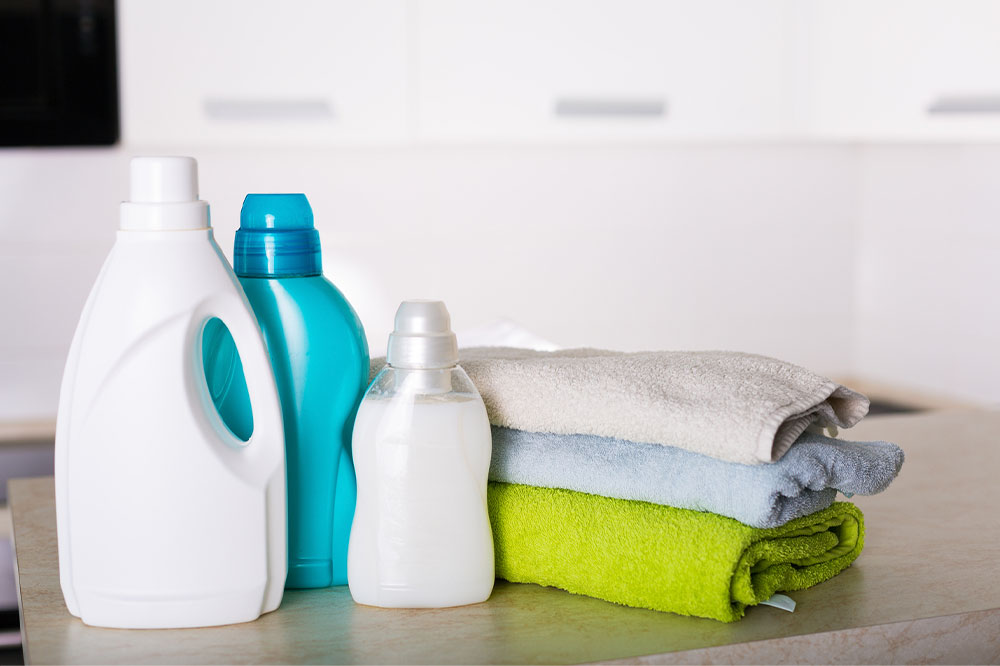
Laundry detergent – Types, ingredients, and eco-friendly brands
Laundry detergents keep our clothes clean and fresh. While they’re easily available, many new and versatile formulas have entered the market, making it hard to choose one that does a fine job without harming the environment. Below, we have listed the types of laundry detergents, the ingredients to opt for and avoid, and a few environmentally-conscious brands. Armed with this information, you can pick the right product for your needs.
Types of laundry detergents
Detergents come in different forms, such as:
- Powder
Powder detergents have been around for decades and are generally effective at removing stains and dirt. They’re particularly suitable for washing heavily soiled clothes and whites. - Liquid
Liquid detergents are convenient to use and excellent for pre-treating stains. They’re also suitable for washing colored fabrics as they tend to be gentler than their powdered counterparts. - Pods
These single-use, pre-measured units are famous for their convenience and portability. Some emerging pods also work as fabric softeners and fragrance enhancers. Essentially, pods can avoid the overuse of detergent since they’re pre-measured. But they’re priced higher than powder and liquid detergents and may not be the most environmentally friendly. - Sheets
These are usually biodegradable strips with a concentrated detergent that dissolves in water. Sheets are relatively lightweight and offer similar benefits as pods.
Ingredients to avoid
Many detergents have ingredients that may harm your health and the environment, so read the label before buying. Avoid products that contain the following:
- Optical brighteners
These chemicals may make fabrics appear brighter but damage clothes over time and cause skin irritation. They’re also considered harmful to aquatic life. - Synthetic fragrances
Artificial fragrances can trigger allergies and respiratory issues. They may also contain harmful phthalates that negatively impact the environment. - Chlorine bleach
Chlorine bleach is not only harsh on fabrics but also harmful to marine life since it produces toxic byproducts. - Phosphates
Excessive use of phosphates can lead to water pollution, so choose detergents with low or no phosphate content.
Some other ingredients to avoid are dioxane, dichlorobenzene, and sodium laureth sulfate.
Ingredients to look for
These detergent ingredients ensure an eco-friendlier and safer laundry experience:
- Naturally-derived surfactants
Look for products with surfactants derived from plants, such as coconut, palm, olive, or avocado. These effectively eliminate dirt and stains while being more environmentally friendly. - Enzymes
Enzymes like hydrolases, protease, and amylase break down stains organically and replace the chemicals used in laundry detergents without compromising cleaning quality. - Essential oils
Some detergents use natural essential oils for fragrance. These are preferable to synthetic fragrances, which can contain harmful chemicals.
Besides healthy ingredients, choose products that come in plastic-free packaging or compostable bottles.
Eco-friendly laundry detergent brands
Here are some eco-friendly brands to consider buying from:
- Seventh Generation
Known for its commitment to sustainability, Seventh Generation offers a range of plant-based detergents free from harmful chemicals and dyes. - Dropps
This brand manufactures detergents with essential oils and plant-derived ingredients and uses minimal packaging. - Puracy
Puracy’s detergents are biodegradable, non-toxic, and free of phosphate and dyes. They also come in recyclable packaging.
The Simply Co., DedCool, Biokleen, and Planet are other renowned and environmentally friendly brands.
A family loads laundry about six to eight times per week on average. The price of doing the laundry ranges between $180 to $600 per year, depending on the detergent type and company.




